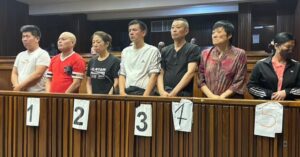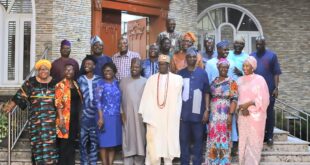 JOHANNESBURG, SOUTH AFRICA – Seven Chinese nationals were convicted in late February in South Africa on nearly 160 charges related to human trafficking, kidnapping, debt bondage, labor law violations, and breaches of occupational health and safety regulations. The sentencing is scheduled for late April.
JOHANNESBURG, SOUTH AFRICA – Seven Chinese nationals were convicted in late February in South Africa on nearly 160 charges related to human trafficking, kidnapping, debt bondage, labor law violations, and breaches of occupational health and safety regulations. The sentencing is scheduled for late April.
Authorities arrested the individuals in 2019 at the Beautiful City blanket factory in Johannesburg.
According to South African online newspaper TimesLIVE, the factory employed 91 undocumented Malawians between 2017 and 2019. Acting on a tip-off, the Hawks’ Serious Organized Crime unit, a branch of the South African Police Service, along with Tactical Response Team members and Department of Labor officials, raided the factory and discovered the victims, including 33 minors aged between 15 and 17.
Maj. Thabo Mokoena, who led the raid, testified at trial about the shocking conditions inside the factory. “The workers didn’t look up when we entered,” Mokoena said, according to The African Mirror.
“They had been conditioned to keep working regardless of what was happening around them. It was only when we started speaking in their language that they realized something was different.”
National Prosecuting Authority spokesperson Phindi Mjonondwane highlighted the inhumane conditions under which the workers were confined and closely monitored by armed guards.
“The victims were forced to work 11-hour shifts, seven days a week, without proper training or safety equipment,” Mjonondwane told TimesLIVE.
One worker reportedly lost a finger and was denied medical treatment. Witness testimonies, mostly from Malawian nationals and one South African truck driver, revealed that victims were lured to the factory with false promises of a better life.
Once insie, they were banned from communicating, forced to operate defective machines without protective gear, and threatened by armed guards.
They were also not allowed restroom breaks during shifts and faced wage deductions if they attempted to use one.
According to The African Mirror, the workers were paid R65 ($3.55) per day, or R6.50 (35 cents) an hour – far below South Africa’s minimum wage.
Many victims recounted how they were previously employed at other Chinese-owned factories under similar false pretenses.
One worker, William, shared his ordeal. “I traveled from my home village after being promised decent work and education. Instead, I found myself sleeping on a thin mattress in a crowded room after grueling work shifts.”
“They took our passports,” William added. “They said we owed them for bringing us here, for feeding us. But the debt never decreased, no matter how much we worked.”
Teresa Mwanza, another survivour who testified at trial, remained silent as the verdicts were read. Since being freed, both she and William have joined a survivor advocacy group, sharing their experiences to help authorities identify and rescue other victims.
“I speak because others cannot,” Teresa said. “There are more factories, more hidden places where people like me are still trapped.”
Following their rescue, many victims were provided with temporary legal status, psychological support, and skills training.
These efforts were coordinated between government departments and non-governmental organizations to help survivors rebuild their lives.
“What makes this case significant is that it exposes the connection between illegal immigration and labor exploitation,” said Nomsa Ndlovu, a human trafficking researcher at the University of Johannesburg. “Victims are vulnerable on two fronts – afraid of their captors and afraid of authorities due to their immigration status.”
Maj. Gen. Ebrahim Kadwa, provincial head of the Directorate for Priority Crime Investigation in Gauteng, emphasized the case’s importance in the fight against human trafficking.
“This judgment sends a message to traffickers operating within our borders,” he said, according to The African Mirror. “South Africa will not tolerate these crimes.”
Despite this conviction, analysts warn that South Africa remains a source, transit point, and destination for human trafficking victims.
In January, South African Police rescued 26 Ethiopians who escaped from a suspected human trafficking ring in Johannesburg, where they had been held naked in a bungalow.
Three individuals were arrested on suspicion of human trafficking and possession of an illegal firearm.
“The signs that we have indicate this is a human trafficking matter,” police spokesperson Philani Nkwalase told The Guardian. “They were actually escaping from that house, and they were kept naked, almost as if it’s a modus operandi to keep them humiliated and prevent them from escaping.”
In another incident in August, authorities discovered 82 Ethiopians crammed into a house in Johannesburg without adequate food, toilet, or bathroom facilities. Nkwalase said it remained unclear whether the cases were connected.
The conviction of the seven Chinese nationals is a major milestone, but experts emphasize that much more needs to be done to combat human trafficking and protect vulnerable individuals from exploitation.
 Startrend International Magazine For Your Latest News And Entertainment Gists
Startrend International Magazine For Your Latest News And Entertainment Gists





